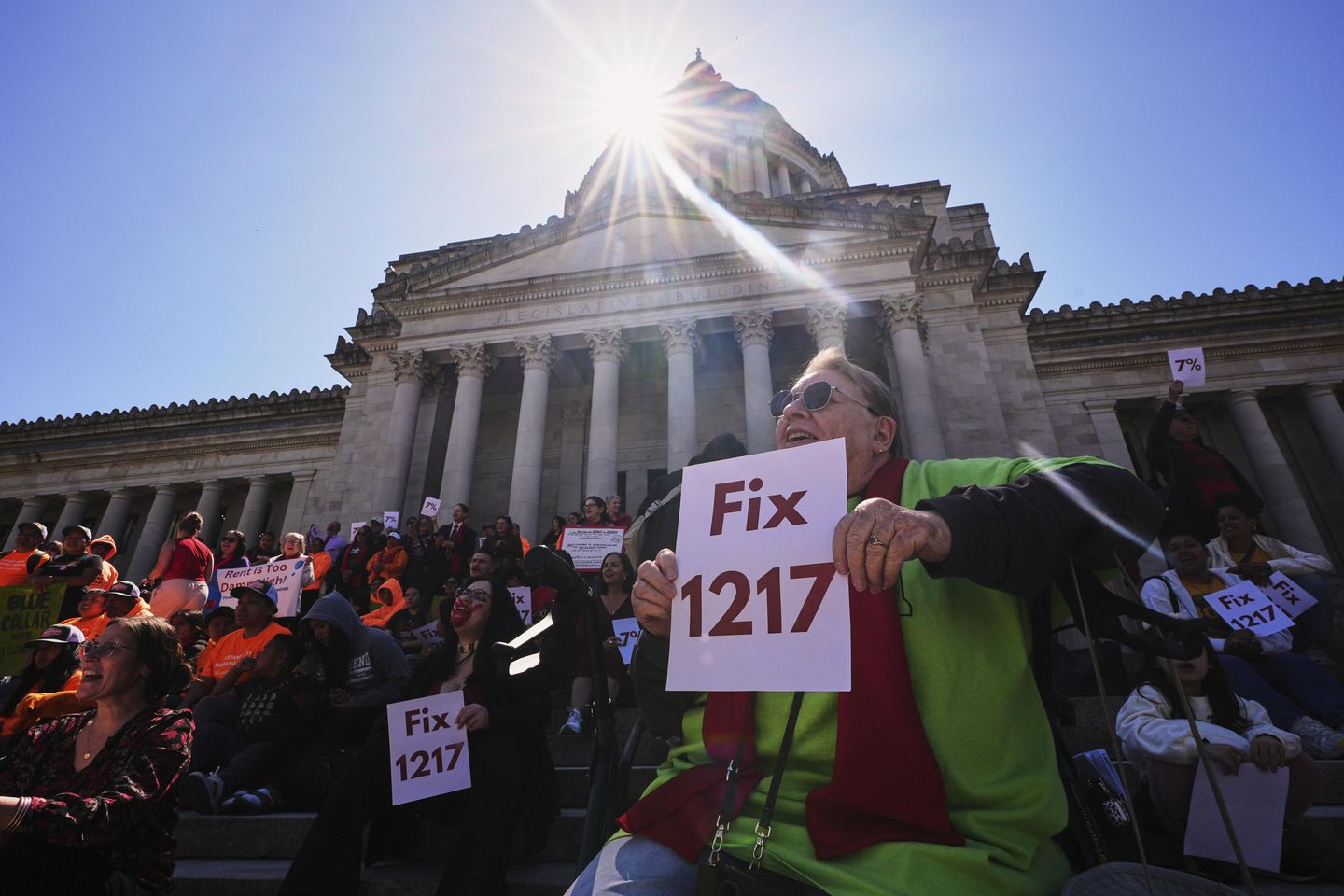
SEATTLE (AP) — Disabled veteran and single parent Duana Ricks-Johnson has moved her family five times in the past four years to keep ahead of rising rents – all while fighting at the state Legislature for a rent control law that hasn’t come.
Now, with rent stabilization legislation tantalizingly close to becoming law, last-minute amendments in the Senate have thrown the fate of House Bill 1217 into question as the end of the session looms. The bill passed the Senate with amendments from two lawmakers that raised the rent increase limit from 7% to 10% plus inflation and exempted single-family homes.
It now goes to the House, and if they reject the Senate changes, it will head to a conference committee with less than two weeks left in the legislative session.
The bill would be one of the first rent stabilization laws in the nation if passed, and add Washington to states like Oregon and California that have turned to such policies in an attempt to curb rampant homelessness. Supporters say the recent changes gut the proposed law – especially by cutting out rent caps for single-family homes – in a state where 40% of the population rents.
“This strategy helps to make sure that people don’t get priced out by excessive rent increases,” said Sen. Emily Alvarado, a Democrat from Seattle who authored the bill.
Opponents of HB 1217 warn that developers will leave the state if it becomes law and argue that similar policies in Oregon and California haven’t slowed the homeless crisis despite adding to those states’ financial burdens.
“I was worried about the impact it would have on supply – and increasing supply is how we lower (housing) costs,” Sen. Sharon Shewmake, a Democrat who proposed the amendment to increase the rent increase limit from 7% to 10%.
The version of the bill that passed the Senate limits rent and fee increases within first 12 months of tenancy and requires landlords to give a 90-day notice of increases – longer than the current 60 days. The bill would take effect on passage and sunset on July 1, 2045. It leaves in place the original 5% rent limit increase for manufactured homes.
Michele Thomas, the policy director at the Washington Low Income Housing Alliance, said she’s convinced lawmakers can compromise.
“Lawmakers in both the House and Senate are continuing to hear from literally thousands, thousands of people across the state who want them to fix the bill and pass a protective version with no more than a 7% increase for residential renters, 5% for manufactured homeowners and also one that doesn’t randomly exempt all people who live in a single family home,” Thomas told The Associated Press.
Oregon passed a rent-control bill in 2019 and lawmakers updated the measure to cap rent increases at either 7% plus the annual 12-month average change in the consumer price index for the U.S. West, or 10%, whichever is lower.
Ricks-Johnson used to live in Oregon, but moved her family to Vancouver, Washington to live closer to her twin sister after she became a victim of domestic abuse. Living on a fixed income – her Veterans Affairs pension – limited her ability to absorb rent increases, which forced her to make multiple costly moves.
“If this doesn’t go through, it just puts a whole myriad of things in motion, like a landslide that my little family wouldn’t be able to recover from,” she said. “Where do we go? If our communities don’t stand behind, and help the weakest of us, we don’t have a good foundation for anybody.”
Dominique Horn, a renter in Camas, Washington who is paying 50% of her income on rent, fears any increase will force her family of four out of their home. For that reason, she said she’s concerned about the Senate amendment that cut out single-family homes, which she said would exclude 38% of renters from the protections in the bill.
Paying first and last month’s rent and deposits, it was over $6,000 for her family to get into housing, Horn said.
“That expense is enough to take a housed family into homelessness, disrupt schooling, jobs, all aspects of the things that make our lives function,” she said. “So being able to predict and plan for what kind of increases would be coming is such an important part of having stability in all aspects of your life.”
Sen. Marko Liias, a Democrat who proposed the successful amendment to exempt single-family homes from the rent cap, did not respond to repeated requests for comment.
Kelley Rhinehart, a landlord who rents out two duplexes in Kitsap County, said he supports the measure because he believes a stable rent creates stability in tenants.
“I don’t think it’s a heavily regulated market. I think it’s a very lightly regulated market and what they’re actually complaining about is the prospect of having any limits set on rent,” he said. “And I think that’s a public policy mistake for the legislature to make. The legislature, at this point, should be willing.”












